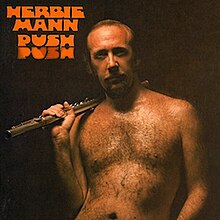Push Push (Herbie Mann album)
| Push Push | ||||
|---|---|---|---|---|
 | ||||
| Studio album by | ||||
| Released | July 1, 1971 | |||
| Genre | Crossover jazz, jazz fusion, soul jazz, jazz-funk, rhythm and blues | |||
| Length | 43:22 | |||
| Label | Atlantic/Cotillion Records/Embryo Records | |||
| Producer | Arif Mardin | |||
| Herbie Mann chronology | ||||
| ||||
| Review scores | |
|---|---|
| Source | Rating |
| Allmusic | |
| Billboard | positive[2] |
| The Rolling Stone Jazz Record Guide | |
Push Push is a 1971 instrumental album by jazz flutist Herbie Mann, on his Embryo Records label with Atlantic, which features rock guitarist Duane Allman.[4] The record explored a range of popular genres, such as R&B, rock and funk music to create what Allmusic calls a "generally appealing, melodic and danceable" album with an "impressive crew of musicians."[5][6]
Background and recording
In 1969, Mann received permission from Atlantic, the label to which he was then signed, to form his own label, which he called Embryo. Push Push was among his first albums to be released on his label.[7]
Chart performance
On the Billboard Top LP's chart dated October 30, 1971, Push Push debuted at number 178. It was deemed a "Star Performer" by the magazine, meaning it had one of the greatest increases in sales over the preceding week.[8] On the chart dated December 4, it attained its peak of 119.[9] It also charted on the Billboard Top R&B/Hip-Hop Albums chart, where it peaked at number 21 on the same date.[10]
Track listing
- "Push Push" (Herbie Mann)
- "What's Going On" (Renaldo Benson, Alfred Cleveland, Marvin Gaye)
- "Spirit in the Dark" (Aretha Franklin)
- "Man's Hope" (traditional, arrangement by Herbie Mann, based on "Hatikvah")
- "If" (David Gates)
- "Never Can Say Goodbye" (Clifton Davis)
- "What'd I Say" (Ray Charles)
- "Funky Nassau" (Ray Munnings, Tyrone Fitzgerald) (CD bonus track)
Jacket design and notes

The original cover, by Joel Brodsky, features an apparently nude Mann from the waist up, holding a flute resting on his shoulder. The album had the second "PUSH" die cut out, with the gatefold featuring a textured (flocked) duotone orange and black print of two torsos engaged in missionary style intercourse (no explicit content). The die cut reveals a small, unrecognizable portion of the print. The album's images generated controversy at the time.[7] Later printings excluded the gatefold print, or eliminated the gatefold format entirely. Liner notes by Mann include: "P.S., Marvin Gaye's album What's Going On is the best album of the year!"
Credits
- Cornell Dupree (guitar)
- David Spinozza (guitar) (incorrectly credited as David Spinoza)
- Gene Bianca (harp)
- Richard Tee (piano, electric piano, organ)
- Chuck Rainey
- Jerry Jemmott
- Donald "Duck" Dunn (bass)
- Bernard Purdie
- Al Jackson, Jr. (drums)
- Ralph MacDonald (percussion).
Guitar solos were by Duane Allman, except on "Man's Hope", which was performed by David Spinozza. The engineer was Jimmy Douglass and the producer was Arif Mardin.
Charts
| Chart (1971) | Peak position |
|---|---|
| US Billboard 200[9] | 119 |
| US Top R&B/Hip-Hop Albums (Billboard)[10] | 21 |
References
- ^ Yanow, Scott. "Review: Push Push - Herbie Mann". AllMusic. RhythmOne. Retrieved January 14, 2019.
- ^ "Billboard Album Reviews". Billboard. 83 (43): 50. October 23, 1971. Retrieved January 14, 2019.
- ^ Swenson, J., ed. (1985). The Rolling Stone Jazz Record Guide. USA: Random House/Rolling Stone. pp. 130. ISBN 0-394-72643-X.
- ^ Kenselaar, Bob. "Herbie Mann: An Amalgamation Of Everything". All About Jazz. Retrieved January 14, 2019.
- ^ Push Push (CD) at fye.com Archived 2011-07-11 at the Wayback Machine
- ^ Push, Push, Herbie Mann, vinyl LP, Embryo Records/Cotillion, division of Atlantic Recording Company, 1971, stereo/SD 532
- ^ a b Ginell, Cary. "NPR's Jazz Profiles: Herbie Mann". National Public Radio. Retrieved January 14, 2019.
- ^ "Top LP's". Billboard. 83 (44): 68. October 30, 1971. Retrieved January 14, 2019.
- ^ a b "Herbie Mann Chart History (Billboard 200)". Billboard. Retrieved February 25, 2020.
- ^ a b "Herbie Mann Chart History (Top R&B/Hip-Hop Albums)". Billboard. Retrieved February 25, 2020.
- ^ "Credits: Push Push - Herbie Mann". Allmusic. RhythmOne. Retrieved January 14, 2019.
